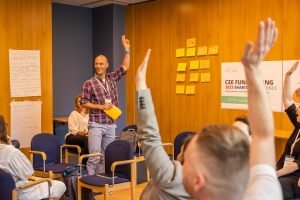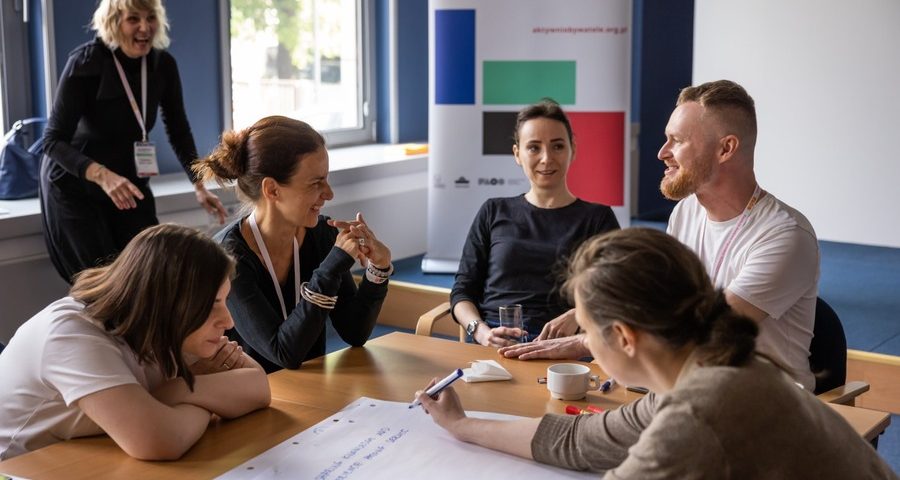
Coalition lobbies for crowdfunding exemption from EU regulation list
August 9, 2023
Dialogue needed to stop banks shutting nonprofits’ accounts, says ECNL
August 9, 2023Warsaw recently played host to the CEE Fundraising 2023 Sharing Experience seminar, which brought together 28 experts in fundraising from Poland, Croatia, Czech Republic, Hungary, Lithuania, Slovakia, Slovenia, Germany, Ukraine and the UK.
The two-day event, held on 25 and 26 May, aimed to facilitate knowledge exchange, foster collaboration, and enhance fundraising capacity among specialists supporting civic organizations in the region. The event was organized by EFA member Academy of Civic Organizations Foundation (FAOO) in Poland; the Association for Civil Society Development (SMART) in Croatia; and the SOLIDARNA Foundation for Human Rights and Solidarity, also based in Croatia.
The seminar aimed to address fundamental questions regarding fundraising capacity building and the implementation of effective procedures and tools within organizations. The event sought to facilitate information and idea exchange, strengthen competencies, develop effective fundraising strategies, and explore the social and economic environment affecting fundraising in the CEE region. Namely, fundraising plays a pivotal role in the independence and development of the third sector, particularly in times of unpredictable crises.
Fundraising in depth
The introductory session on first day featured several presentations and discussions on various topics related to fundraising. Richard Docwra from ChangeStar (UK) delivered a talk on fundraising from individuals, sharing five lessons from the UK context. This session was followed by a Q&A session. Eduard Marček from the Slovak Fundraising Centre discussed the availability of relevant data for fundraisers and where to find it. Marina Škrabalo from SOLIDARNA Foundation for Human Rights and Solidarity talked about current philanthropic trends in Croatia and lessons learned from the recent crisis period. Giedrė Šopaitė-Šilinskienė from Fundraising@LT provided an overview of the fundraising sector in Lithuania.
The following session focused on mapping fundraising strategies, methods, and tools. Zoran Grozdanov from the Center for the Culture of Dialogue shared the story of “My Place Under the Sun” and discussed cross-sectoral alliances as anchors of financial sustainability. Jan Gregor from Svět Neziskovek talked about resilient NGOs and Marianna Wartecka from Ocalenie Foundation discussed corporate fundraising for refugees.
The day ended with a foresight session in groups, where participants discussed the future of fundraising in CEE countries and identified possible scenarios, developments, threats, and opportunities. Breakout sessions were organized to set up working groups for the next day, and participants were encouraged to select topics for further discussion.

Photo by Maciek Jóźwiak & Anna Liminowicz
Insights shared on challenges and opportunities
The second day of the seminar enabled small group discussions on challenges and opportunities related to provision of fundraising training and consultancy and promotion philanthropy through communication, donor engagement and advocacy.
The discussion on challenges faced in providing fundraising consultancy support highlighted several issues – the prevalent “free of charge” culture in the NGO sector; managing freelance consultants through an agency; ensuring programme quality through certification and promoting national standards; consultant as well as client burnout; and the importance of setting boundaries, training and retaining junior consultants.
To improve the quality and impact of fundraising consultancy support, several strategies were proposed. There is a clear need for addressing the “free of charge” mindset in NGOs, managing client expectations and establishing clear boundaries between consultants and client organizations. Further branding of fundraising can be achieved through success stories, media outreach and promotion of quality standards in the sector. Greater effectiveness of fundraising support can be achieved by conducting regular needs assessments, knowledge sharing among consultants and partnerships with academia, continuous training opportunities, development of certified programs with materials in national languages and more dynamic regional networking and collaboration among fundraising experts.
The group discussion on effective communications emphasized the importance of producing compelling content that resonates with individuals and companies beyond existing support circles. This can be achieved by highlighting the impact of philanthropy and showcasing success stories.
Strategic collaboration among donors was identified as a pivotal means to enhance communication efforts and expand the overall pool of contributors. Segmenting audiences and employing various frames of reference were deemed crucial in tailoring messages effectively. Different target groups respond to different messaging approaches, such as moral obligation, catalyst for innovation and development, lasting lifestyle practice, tool for additional private funding of public responsibilities, or even a political act. Incorporating activities that actively involve people and add value to their lives was encouraged to encourage philanthropic participation. Special focus should be put on engaging youth concerned about climate action and social impact. Additional attention should be paid to ways we accommodate the preferences of “introverted” donors who prefer anonymity or private engagement.
The group discussion also emphasized the need to address potential threats to public trust in philanthropy, such as incidents of fraud. Cultivating a culture of transparency among donors and consistently highlighting the positive impact of philanthropy on societies can help mitigate such concerns and maintain public trust.
The event received financial support from the Active Citizens Fund, funded by Iceland, Liechtenstein, and Norway through the EEA Grants and Norway Grants 2014-2021.
Photos by Maciek Jóźwiak & Anna Liminowicz




